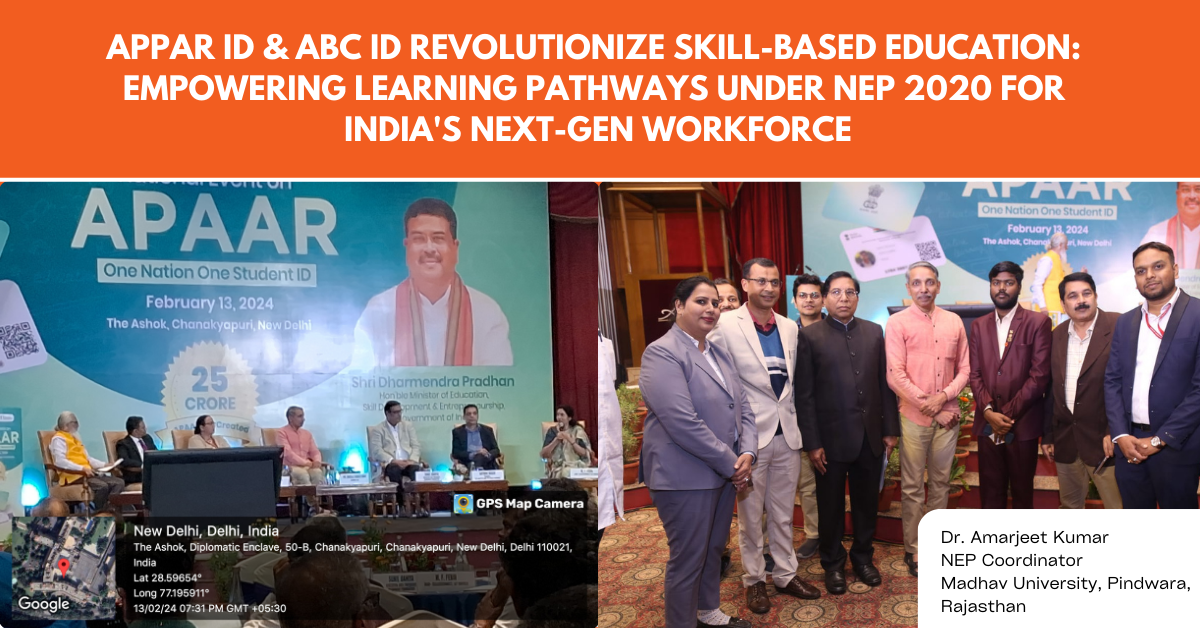Many important aspects have emerged regarding Apar ID and school education. In recent years, many steps are being taken regarding digitalization of the education system. In this sequence, it has been made mandatory for the students studying in universities and colleges to open an account in Academic Bank of Credit, while there is a plan to accommodate the students studying in Apar ID on the format of Academic Bank of Credit. In such a situation, it will be easy to ensure effective monitoring along with providing benefits of government schemes and scholarships to the students studying in schools. Generally, due to employment and job transfer, the educational sessions of children are affected. In such a situation, the requirement of school leaving certificate can be eliminated through Apar ID, because it will be possible to verify the data of students through digital medium. The Central Government is working on many policies on the school drop out rate of children pursuing school education and effective monitoring of result based education. It is noteworthy that under the National Digital Education Architecture (NDERA), Vidya Samiksha Kendras (VSK) are being established in the states by the Ministry of Education. It will cover data of schools, teachers and students and will be meaningfully analyzed using big data analytics, Artificial Intelligence (AI) and machine learning to enhance holistic monitoring of the education system, thereby improving access outcomes. In such a situation, Apar ID can become a suitable medium for improving and monitoring the teaching quality of schools.
The need and utility of Apar ID is also important in the context of students of higher educational institutions. Because this unique and permanent 12-digit ID will have a comprehensive database of a student’s higher education or technical and skill-based knowledge. So that skill based human resource requirement and a target based skill development action plan can be worked out. It is noteworthy that during the unveiling of Apar ID, the discussion of skill-based human resources in industrial sectors was given prominence. Whereas during this time, the Chairman of the University Grants Commission has also talked about including microcredentials in academic degrees. In such a situation, working together with Skill India Digital and Apar ID will be more effective. What is important is that microcredentials are small, individual learning units added to broader qualifications. It is worth noting that the main difference between a microcredential and a graduate certificate, minor or degree is the time taken to complete the studies. While microcredentials typically range from 9 to 12 quarter credits, while a full bachelor’s degree is typically 90 credits, these qualifications serve as stepping stones toward broader educational goals. Thus, these credentials help bridge the gap between a single course and a full degree. However, a lot still needs to be done on the necessary guidelines and its outline.
Registration of students in Academic Bank of Credit (ABC) has been made mandatory in higher educational institutions. Through which students will be transferred to their ABC ID in the form of degree credit. It is noteworthy that under the New Education Policy 2020, in the curriculum prepared on the basis of multiple entry and exit option, students studying in higher educational institutions have an option to re-release the remaining studies through ABC ID if they leave their studies midway. Will become the medium. While a student can complete his/her education from one educational institution to another during a degree, part of the ABC curriculum can be studied through online mediums such as National Program on Technology Enhanced Learning (NPTEL) and Massive Open Online Courses (MOOCs). Provides facility to earn degree by earning credit. In such a situation, it is important that on one hand an educational institution provides a better education to the student and an option to continue his education while changing the place of residence. At the same time, it will also increase competition among higher educational institutions which is in the interest of students.
The issue of fake degrees is not a new thing in the country, while many guidelines related to it and lists of fake institutions are issued from time to time. In such a situation, verification and monitoring of degree can be done easily by linking ABC and Apar ID with Aadhaar and DigiLocker. Importantly, under AAPAR ID, all the certificates and credits of a student, whether acquired through formal education or informal education, can be stored digitally, with the responsibility of storing it securely on the authorized institutions. It happens In such a situation, wastage of time and human labor in physical verification of certificates can be avoided and the long process of verification of fake degrees can be done easily. Digital medium can become an effective option to bring effectiveness in the complex structure of the education system in the country.
Transparency in school education and higher education: Transparency in school education and higher education can be discussed on many dimensions. In case of financial irregularities related to education or quality education, it will be easy for educational institutions to monitor the real-time status of various projects/activities within the scope of holistic education through digital medium. For example, in Apar ID, real-time monitoring of scholarships being received by students can be done, while by identifying the target group, the formulation of a scheme and its implementation can be made effective. Creating outcome based curriculum, reducing dropout rates, providing necessary training to teachers and monitoring it becomes important to improve the quality of education. Most importantly, there is a need to set up a centralized help desk for grievance redressal mechanism for the stakeholders of the ecosystem of educational institutions. In such a situation, digitization of educational data will facilitate identification and analysis of problems and areas for improvement in decision making and implementation, which need immediate attention.
At present, all the sectors are based on complex structure, in such a situation, proper people can be employed through expertise and skills in the concerned field. Generally it is seen that apart from educational qualification, any other skill based knowledge is not certified. In such a situation, AAPAR ID can become a medium for authentication of formal or informal skill-based knowledge and analysis of credit at a granular level such as skill credit, sports or social work. In such a situation, certification of a person’s practical knowledge in many fields like industrial, social, sports, health etc. will make it easier to provide him employment on the basis of his skills. At the same time, it will become easier to meet the need of skilled people in related fields. Apar ID stores all the certificates related to the educational and skill based knowledge of a person, in such a situation the government can monitor the employment status of the concerned person. Although Apar ID can be used on a broader basis over time, it needs to be implemented effectively.
Dr. Amarjeet Kumar
NEP Coordinator
Madhav University, Pindwara, Rajasthan

